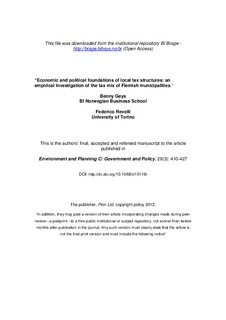Economic and Political Foundations of Local Tax Structures: An Empirical Investigation of Flemish Municipalities’ Tax Mix
| dc.contributor.author | Geys, Benny | |
| dc.contributor.author | Revelli, Federico | |
| dc.date.accessioned | 2012-03-23T08:42:50Z | |
| dc.date.available | 2012-06-30T23:00:15Z | |
| dc.date.issued | 2011 | |
| dc.identifier.issn | 1472-3425 | |
| dc.identifier.uri | http://hdl.handle.net/11250/93546 | |
| dc.description | This is the authors’ final, accepted and refereed manuscript to the article | no_NO |
| dc.description.abstract | Building on the revenue structure theory developed by Hettich and Winer (1984, 1988, 1999), this paper is the first to investigate the economic and political determinants of local tax mix choices. We thereby use panel data on 289 municipalities in the Flemish region of Belgium (period 1995-2002), where local governments enjoy extensive fiscal autonomy and have a wide choice of available tax instruments. Estimating a system of five reduced-form equations for the five central revenue sources (income, property, business, user fees and other own revenues), our results show that economics plays a significantly more important role than politics in shaping the local tax mix. Moreover, supporting theoretical predictions about marginal cost equalization across available tax instruments, absolute reliance on each revenue source increases as the overall revenue requirement gets larger (a ‘scale-effect’). | no_NO |
| dc.language.iso | eng | no_NO |
| dc.publisher | Pion Ltd | no_NO |
| dc.subject | tax mix | no_NO |
| dc.subject | local government | no_NO |
| dc.subject | decentralization | no_NO |
| dc.subject | fiscal policy | no_NO |
| dc.title | Economic and Political Foundations of Local Tax Structures: An Empirical Investigation of Flemish Municipalities’ Tax Mix | no_NO |
| dc.type | Journal article | no_NO |
| dc.type | Peer reviewed | no_NO |
| dc.source.pagenumber | 410-427 | no_NO |
| dc.source.volume | 29 | no_NO |
| dc.source.journal | Environment and Planning C: Government and Policy | no_NO |
| dc.source.issue | 3 | no_NO |
| dc.identifier.doi | 10.1068/c10116r |
Tilhørende fil(er)
Denne innførselen finnes i følgende samling(er)
-
Scientific articles [2181]
